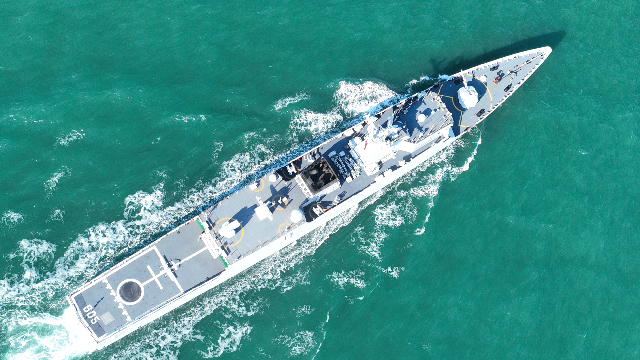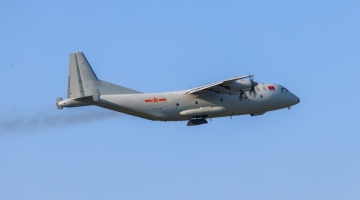By Wang Xu
王旭
Amidst global turmoil, chaos is spreading to the seas. Following the disruption of the Black Sea grain route due to the Russia-Ukraine conflict, the Red Sea shipping lanes are now being affected by the spillover effects of the Palestinian-Israeli conflict. The Red Sea crisis sparks increasing global attention, highlighting major changes in the global maritime geopolitical landscape.
全球变乱频发,正向海上外溢。继黑海粮道因俄乌冲突受阻之后,红海航道正受巴以冲突外溢效应袭扰。红海危机引发全球关注,凸显全球海洋地缘的大变局。
Countries in the Middle East have reacted lukewarmly to the US campaign “Operation Prosperity Guardian”. European countries have distanced themselves from the campaign because they are unwilling to hand over naval command. Italy, France, and Spain have made it clear that they will not follow the action against Yemen without authorization from the United Nations Security Council. Several merchant ships have used "China's interests are involved" as a reason to avoid maritime risks in the Red Sea, and many insurance companies have explicitly stated that “war risk insurance cannot be applied to US, UK, and Israeli vessels sailing towards the Red Sea.”The unthinkable "disassociation" and "refusal of insurance" are happening to the world's only maritime hegemon. To be precise, the decline of US maritime hegemony did not begin today, but the attack on ships in the Red Sea by Houthi rebels has severely damaged the US-led maritime security order and the credibility of maritime hegemony, which will greatly accelerate this process.
全球变乱频发,正向海上外溢。继黑海粮道因俄乌冲突受阻之后,红海航道正受巴以冲突外溢效应袭扰。2023年11月中旬开始,也门胡塞武装以支援巴勒斯坦为由在红海发动袭船战,拉开红海危机序幕。2024年1月12日美英对也门发动空袭后,其将“所有美英利益列为合法打击目标”。双方你来我往,红海危机引发全球关注,凸显全球海洋地缘的大变局。
The reasons for the US to attack the Houthi rebels in Yemen are numerous, but the reasons for not doing so are even more immediate and painful. The US is caught in a dilemma between maintaining its maritime hegemony and retreating from its strategic posture. On one hand, maritime hegemony is the cornerstone of US global hegemony. Maintaining the commitment to "freedom of navigation" and providing maritime security products are essential for the US to maintain its global hegemony. On the other hand, the Red Sea-Suez is not the main shipping route for US foreign trade. Some US media have even pointed out that the disruption of Red Sea shipping is beneficial for US energy exports to Europe. Given its own interests, the US does not seem to need to invest excessively in the region.
美国打击胡塞的理由很多,但是不打的理由更直击痛处,即,美国陷入了维系海洋霸权和收缩战略布局的两难境地。一方面,海洋霸权堪称美国全球霸权的基石,捍卫“航行自由”承诺和供给海上安全产品是美维系全球霸权的题中之义。另一方面,红海—苏伊士不是美国外贸主航线,甚至有美国媒体指出红海断航利好美国能源对欧洲出口,从切身利益考虑,美国似乎没有必要过度投入其中。
Moreover, the US is determined to disengage from the Middle East to strengthen its "Indo-Pacific Strategy". If it is drawn deeper into the Houthi rebels, it is obviously not in line with the strategic direction of focusing on containing China. To shrink, or to maintain maritime hegemony in the Red Sea? This contradiction is the deep reason why the US has been struggling with its stance on the Red Sea crisis for more than two months because a declining US maritime hegemony can no longer reduce resource investment while quickly resolving crises.
更何况,美国下定决心从中东抽身,以便强化“印太战略”,如果被胡塞越拖越深,显然不符合集中精力遏制中国的战略方向。是收缩还是维系在红海的海洋霸权?这种矛盾性是两个多月来美国应对红海危机态度纠结的深层原因,因为海洋霸权衰落的美国已经难以做到既减少资源投入又快速了结危机。
At the same time, this Red Sea crisis will also lead to a subversion of the global pattern of naval warfare.
与此同时,此次红海危机,还将引发全球海战样态的颠覆。
First, the US, which was the first to use drones on the Afghan battlefield, is now experiencing setbacks from the challenges posed by drones. This reflects a revolution in naval warfare. Aided by the support of technological revolution, unmanned and intelligent operations have become the key to asymmetric competition at sea. Drones have become a convenient new tool for maritime blockades, while the integration of land, sea, air, and cyberspace has created an intelligence analysis and early warning platform for all-domain awareness. This has ushered in a "transparent era" for maritime operations. Maritime situational awareness technology is rewriting the existing deterrence paradigm of waiting for opportunity at chokepoints in the straits. In addition, the deployment and practical application of intelligent unmanned equipment will lower the threshold for warfare and bring about indiscriminate casualties.
第一,美国最早在阿富汗战场使用无人机,如今正被无人机带来的挑战所反噬,这反映出海战样态的革命。在科技革命加持下,无人化、智能化成为海上非对称竞争的撒手锏。无人机成为海上封锁的便利新工具,陆海天空网联动的海域态势感知技术搭建起全域感知的情报分析和预警平台,海洋行动步入“透明时代”。海域态势感知技术正在改写在海峡咽喉处守株待兔的既有威慑范式。而且,智能无人装备的列装和实战化还将降低战争门槛,带来无差别杀伤。
Second, with the strengthening of naval deterrence, "regional denial" has become more difficult to achieve, and "land-based control of the sea" has replaced "sea-based control of the land" as the decisive factor in naval warfare. At present, US and UK attempts to destroy Houthi missile launchers and drone facilities through air strikes have not yielded significant results in degrading their long-range strike capabilities. The Houthis' weapons systems are characterized by dispersed and mobile deployment, making them difficult to eliminate short of US and UK ground operations. This poses a challenge to the existing maritime military hegemony of "overseas military bases + naval forces". This is why the US and Japan are working together to strengthen the “Southwest Islands Wall” and are keen to increase the number of military bases in the Philippines to reduce the risk of carrier battle groups and bases being targeted. Nevertheless, the presence of maritime hegemonic countries coming from distant seas will be weakened in the near seas and pushed further into distant waters.
第二,随着沿岸势力向海威慑力的强化,仅凭海上力量已难以完成反“区域拒止”,“以陆制海”取代“以海制陆”成为近海海战的胜负手。目前看,美英试图通过空袭来摧毁胡塞导弹发射基地和无人机设施,以削弱其远程打击能力的效果不彰。胡塞武器系统具有分散和可移动部署的特点,只要不遭遇美英地面行动就很难被全面清除。这将对既有的“海外军事基地+海上力量存在”的海洋军事霸权形成挑战。因此美国与日本联手巩固“西南诸岛之墙”,急于增加在菲律宾的军事基地,欲通过在岛链关键处打造更多的陆域支点,来降低航母战斗群和支点被打击的风险。尽管如此,自远洋而来的海洋霸权国家在近海的存在减弱、被推向更远海域将是大势所趋。
Third, non-state actors will play a greater role in future maritime battlefield. The Houthis' naval capabilities are backed by state support and can be exploited by certain countries. The Houthis' declaration of "support for Palestine" has gained moral backing, which to some extent influences the world's perception of the attacks on ships in the Red Sea. As technology diffuses, the maritime combat capabilities and cognitive influence of non-state actors will continue to grow. Unlike traditional pirates or maritime smugglers, their involvement in shaping maritime security situations is continuous and intense. This could become a new variable in the maritime security competition between states, especially the major powers.
第三,非国家行为体将在未来海上战场发挥更大作用。胡塞所拥有的对海作战能力,背后有国家支持,又可为一些国家所用。胡塞宣示“支持巴勒斯坦”争取了道义支持,这在一定程度上影响着世界看待红海袭船事件的态度。随着技术扩散,非国家行为体所拥有的海战战力和认知影响力将进一步提升,其不同于传统海盗或海上走私犯罪,对于海上安全态势塑造的参与和作用是持续的、高烈度的,或成为国家间特别是大国间海上安全博弈的新变量。
(The author is the Deputy Director of the Institute of Maritime Strategy at the China Institute of Contemporary International Relations)
(作者系中国现代国际关系研究院海洋战略研究所副所长)
Editor's note: Originally published on chinanews.com, this article is translated from Chinese into English and edited by the China Military Online. The information and opinions in this article do not necessarily reflect the views of eng.chinamil.com.cn.









